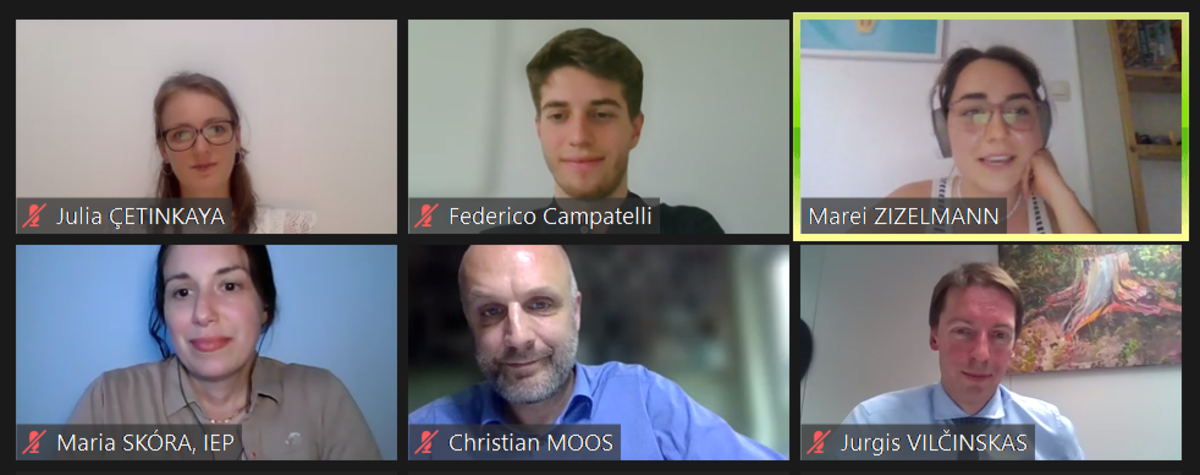The European Parliament building in Strasbourg. Symbolic photo: Colourbox
When an EU member state undermines the rule of law, a rift goes through European democracy. The audience following the "Online Round Table on Democracy 2023" provided an eloquent example, when Eszter Nagy asked to make a statement online from Budapest.
The “Round Table on European Democracy” is a digital event initiated by the Jean Monnet Chair of European Politics at the University of Passau and the Otto von Guericke University Magdeburg in collaboration with the Union of European Federalists and the Spinelli Group in the European Parliament. It has the objective of bringing together students, MPs and experts from across Europe and to critically assess developments in European democracy from a research-driven perspective. Over time, the university network has grown. The University of Bonn, the European Universities Viadrina and Flensburg as well as the Universities of Innsbruck, Paderborn and Vienna have joined in.
Together with Julia Çetinkaya from the University of Magdeburg and students from Passau, Bonn and Magdeburg, political scientist Julian Plottka, who works at the Universities of Passau and Bonn, developed the content for the current Round Table in a university course. They held a competition to select the team of moderators among applicants from different universities. Marei Zizelmann, a student of “Governance and Public Policy” at the University of Passau, was chosen to moderate the event together with Federico Campatelli, a student of “European Studies” at the University of Magdeburg. The theme of the Round Table was “European Democracy under Threat: How to Make EU Democracy Resilient Against Internal and External Challenges?”

Panel of the "Online Round Table on Democracy 2023": Julia Çetinkaya (University of Magdeburg), student moderator Federico Campatelli (University of Magdeburg), student moderator Marei Zizelmann (University of Passau), Dr. Maria Skóra (Institut für Europäische Politik in Berlin), Christian Moos (Secretary General of the Europa-Union Deutschland) und Jurgis Vilčinskas (Deputy Head of Strategic Communications of the European External Action Service).
Guarding against external manipulation
“Especially in view of the European elections 2024, it is important to contrive new tools that strengthen and protect our liberal democracies,” says Plottka. Member of European Parliament Sandro Gozi from Renew Europe Group, who joined the Round Table online, endorsed this: “We have to protect ourselves and our citizens from manipulation by other states. These include Russia and China. But Turkey, Saudi Arabia, Qatar, and Venezuela have also actively tried to attack our democratic systems.”
There are not only external risks, however. Eszter Nagy who joined the audience online from Budapest asked what happens when a member state undermines EU values. She is president of the Hungarian section of the European Federalists. “Over 90 percent of the Hungarian media are dominated by state propaganda, which also spreads Russian propaganda. They broadcast it directly on state television,” she told the other participants. Surveys have shown the effect this has had on what citizens think: “Many believe that the US is responsible for the Russian war of aggression.”
Is the EU too passive in Hungary?
Nagy criticised the European Union, finding it too passive in how it was dealing with the anti-EU campaigns in her country. “In Hungary you have massive poster campaigns against the sanctions imposed by Brussels; the EU is being continuously attacked,” she says. “The people in Hungary are pro-European. But if they are assailed this way, there is a risk that this support will dwindle.” She demanded that the EU strengthen independent media and civil society organisations and that the EU respond with pro-European campaigns.
Theoretically, the EU has tools to protect its values. They include the sanctions procedure set forth in Article 7 of the Treaty on European Union. One attendee wanted to know what the current status was in the procedures launched against Hungary and Poland. Dr Maria Skóra, research associate at the Institut für Europäische Politik in Berlin, who researches this topic and has also a personal interest in the matter as she originally hails from Poland herself, provided an answer.
First, she clarified that Hungary and Poland are the EU’s problem children because they are in breach of the basic principles of the rule of law, such as the separation of powers, freedom of the media and an independent judiciary. Thus, they pose a threat to democracy in Europe: “In doing that, they are reneging on the pledge of holding up European values they made at the time of accession.”
The EU’s founding fathers would have been appalled by the 'democratic backsliding' we are witnessing today.
Maria Skóra, Institut für Europäische Politik, Berlin
However, she also underscored: “It is not the EU’s primary task to deal with with these trends in the member states”, and went on to explain that it is actually the responsibility of member states to remedy the infringements the Commission has identified. Originally, the idea of Article 7 was deterrence. However: “The EU's founding fathers would have been appalled by the 'democratic backsliding' we are witnessing today." She then commended the European Union for reacting quickly to additional infringements, including the Polish anti-opposition law and the Hungarian anti-LGBT law.
Christian Moos, Secretary General of the Europa-Union Deutschland, the German Section of the European Union of Federalists, and member of the European Economic and Social Committee, believes the infringement proceedings do not go far enough. In an article he wrote for the online portal euractiv.de, he called for the exclusion of Hungary from the EU not only because the country has become a difficult EU member but also because it poses a major security risk.“Where the legal basis is missing in the treaties, solutions must be found outside the treaties.” At the Round Table he argued that democracy is sustained by civil society: “Strong democratic parties, strong labour unions, strong non-governmental organisations. Democracy is where people put democracy into practice, where they become involved.”
The key to resilient democracies also lies in civil society. It is here that Jurgis Vilčinskas, Deputy Head of the Division “Strategic Communication, Task Forces and Information Analysis” of the European External Action Service, sees the strength of democratic systems: “I believe that democracies are not protected per se from crimes or corruption. But we have a lot of power to reinvent ourselves.”

Professor Daniel Göler
Where is the European Union going?
Where is the European Union going?
Professor Daniel Göler holds the Jean Monnet Chair of European Politics at the University of Passau. His research focuses on all matters concerning European integration. Naturally, this involves academic networking across the globe. At the same time, the chair makes European political topics accessible to the general public by organising events and publishing the Jean Monnet Papers.




![[Translate to English:] [Translate to English:]](https://www.digital.uni-passau.de/fileadmin/_processed_/e/e/csm_2022Europa-Flaggen_Ukraine_Goeler_5756091d97.png)